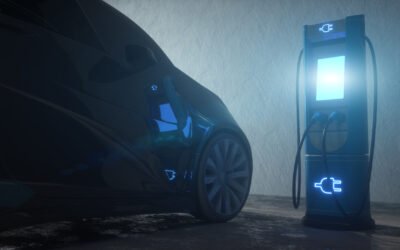- 4 million LCVs were sold in 2020 in the EU, accounting for 82% of commercial vehicle sales.
- As far as electrification trends in the bus market is concerned, Netherlands, Germany and UK are the leaders in the EU.
- According to UNFCCC, trucks, despite being only 2% of total vehicles on road, contribute 22% of total CO2 emissions from road transport.
Power Technology Research defines the commercial vehicle category to include buses, trucks, and LCVs (Light Commercial Vehicles). This article gives an overview on the EU electrification targets which are driving the electrification of commercial vehicles. Also, the article covers the commercial vehicle in the EU and the UK.
Targets for Electrification of the Public and Goods Transport Sector
Germany, a key commercial EV market in the EU, adopted their Climate Action Plan 2050 in 2016. The plan is a long-term emission reduction strategy and is guided by the UN Paris Agreement. The agreement, which was ratified by the EU, includes a long-term plan to become carbon neutral by 2050 and sets targets for the years leading up to 2050. Germany set a medium-term target to reduce greenhouse gas emissions by at least 65%, compared to 1990 levels, by 2030 and 88% by 2040.
The German goals are in line with the European Union where the European Green Deal requires a reduction in Greenhouse Gas (GHG) emissions by up to 100% by 2050. In July, the EU set the interim goal of cutting GHGs by at least 55% by 2030 and affirmed that it was on track to meeting the GHGs emission reduction for 2020 which were:
- 20% cut in GHG emissions from 1990 levels
- 20% energy from renewables
- 20% improvement in energy efficiency
Electrification Trends in the LCV Market
LCVs, also referred to as last mile delivery vehicles, account for the largest share in the commercial vehicles annual market. In the EU around 1.7 million commercial vehicles were sold in 2020 and 1.4 million were LCVs (82% of total sales). Due to Covid-19 there was a surge in e-commerce, which in turn led to a sharp rise in the number of last mile delivery vehicles which led to an increased fossil fuel consumption and to rise in emissions. This, in turn, is pushing the fleet operators in the region to actively electrifying their vans and other delivery vehicles.
France, Germany and the UK were the leaders in the electric LCV market in 2020. (Figure 1)

Figure 1: Share of electric LCVs EU and UK.
Source: Power Technology Research
Around 57,000 electric LCVs were active in France followed by 31,000 and 15,000 active LCVs in Germany and UK respectively. Currently, in 2021, Germany is the leader growth with 3% of LCVs sold in 2021 will be electric LCVs whereas in the rest of the EU around 2% of the LCVs sold will be electric.
Electrification Trends in the Bus Market
A major hurdle in the uptake of electric vehicles is the upfront cost of the vehicle, which is higher than ICE powered vehicles. But in the case of buses, specifically transit buses which have a higher utilization rate, electrification makes more sense as the total cost of ownership is driven down due to reduced fuel and maintenance charges in the long run.
As far as electrification trends in the bus market is concerned, Netherlands, Germany and UK are the leaders. (Figure 2).

Figure 2: Share of electric buses in EU and UK.
Source: Power Technology Research
About 12% of buses sold in Germany in 2021 will be electric where in the rest of the EU, the electrification rate will be higher, accounting for around 19% in 2021. With the most electric buses, Netherlands is the leader in the EU.
Electrification Trends in the Truck market
In 2017, according to UNFCCC data, emissions were split 85%/15% between trucks and buses. This is despite trucks being only 2% of the total vehicles on road. Trucks contribute 22% of CO2 emissions, and the climate impact of heavy-duty vehicles has increased 9% over three years and is one of the fastest growing. Electrifying trucks is a difficult task, due to battery duration and performance, but it will be necessary to do so to achieve climate goals.
Germany led the electric truck market in the EU, with around 600 active electric trucks followed by UK which had 400 electric trucks in 2020. As far as the electrification rate in trucks in the EU, around 1% trucks sold in 2021 will be electric and Power Technology Research expects the rate in the region in 2028 will climb to 3%.
Looking Ahead
Electric vehicles depend on the charging infrastructure and its availability. Governments in the EU, through incentives and tax rebates, have been promoting the installation of EV chargers and it is expected that there will be enough chargers to serve the increasing number of EVs in the market. Figure 3 shows some of the current policies around the world for encouraging charging infrastructure. It is important to note that the electrification of the transport sector needs to be backed up with integration of renewables in the grid, otherwise EVs would be counter-productive and increase emissions instead of decreasing them.
As the transport sector alone contributes 24% of direct CO2 emissions from fuel combustion, per the International Energy Agency, this accounts for a significant portion of global GHG emissions. Most of the global community is committed to the Paris Agreement with the goal of limiting global warming to well below 2 degrees Celsius, preferably to 1.5 degree Celsius as compared to pre- industrial levels. To achieve this goal, it will be necessary that commercial vehicles especially trucks are electrified soon.

Figure 3: Incentives in the global EV charging market.
Source: Power Technology Research
EV Charging Infrastructure Service Overview
The research presented in this article is from PTR's EV Charging Infrastructure market research. For information about this service please submit a request shown below.
Contact Sales:
More about our:
EV Charging Infrastructure Market Research
Recent Insights
Exploring the European EVCI Services Market Key Players and Emerging Trends
There has been a significant surge in the development of EVCI due to the widespread adoption of EVs in Europe. By 2030, it is expected that Europe...
Nordics EVCI Market Comparison: Quarterly Growth and Market Dynamics – 2024
This infographic examines the ambitious policies and regional targets that are propelling the growth of Electric Vehicle Charging Infrastructure...
Electrifying Future: Emerging Trends and Strategic Targets in the Middle East
This infographic presents an overview of the burgeoning electric vehicle (EV) market in the Middle East. It highlights the region's ambitious...


